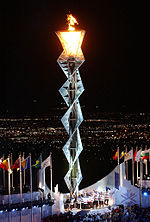The Winter Olympic Games (French: Jeux olympiques d'hiver) is a major international multi-sport event held once every four years for sports practiced on snow and ice. The first Winter Olympic Games, the 1924 Winter Olympics, were held in Chamonix, France. The modern Olympic Games were inspired by the ancient Olympic Games, which were held in Olympia, Greece, from 776 BC to 394 AD. The Baron Pierre de Coubertin of France founded the International Olympic Committee (IOC) 1,500 years later in 1894, leading to the first modern Summer Olympic Games in Athens, Greece in 1896. The IOC is the governing body of the Olympic Movement, with the Olympic Charter defining its structure and authority.
The original five Winter Olympic Sports (consisting of nine disciplines) were bobsleigh, curling, ice hockey, Nordic skiing (consisting of the disciplines military patrol, cross-country skiing, Nordic combined, and ski jumping), and skating (consisting of the disciplines figure skating and speed skating). The Games were held every four years from 1924 to 1936, interrupted in 1940 and 1944 by World War II, and resumed in 1948. Until 1992, the Summer Olympic Games and the Winter Olympic Games were held in the same year. A decision to change this was made in 1986, when during the 91st International Olympic Committee session, IOC members decided to alternate the Summer Olympic Games and the Winter Olympic Games on separate four-year cycles in even-numbered years. Also, at that same congress it was decided that 1992 Winter Olympics would be the last to be held in the same year as the Summer Games and that to change the rotation, the edition that would be held in 1996 would be brought forward by two years, being scheduled to 1994. After this edition, the next one was to be held in 1998 when the 4-year Olympic Cycle resumed.
The Winter Olympic Games have evolved since their inception. Sports and disciplines have been added and some of them, such as alpine skiing, luge, short track speed skating, freestyle skiing, skeleton, and snowboarding, have earned a permanent spot on the Olympic program. Some others, including curling and bobsleigh, have been discontinued and later reintroduced; others have been permanently discontinued, such as military patrol, though the modern Winter Olympic sport of biathlon is descended from it. Still others, such as speed skiing, bandy and skijoring, were demonstration sports but never incorporated as Olympic sports. The rise of television as a global medium for communication enhanced the profile of the Games. It generated income via the sale of broadcast rights and advertising, which has become lucrative for the IOC. This allowed outside interests, such as television companies and corporate sponsors, to exert influence. The IOC has had to address numerous criticisms over the decades like internal scandals, the use of performance-enhancing drugs by Winter Olympians, as well as a political boycott of the Winter Olympic Games. Countries have used the Winter Olympic Games as well as the Summer Olympic Games to proclaim the superiority of their political systems.
